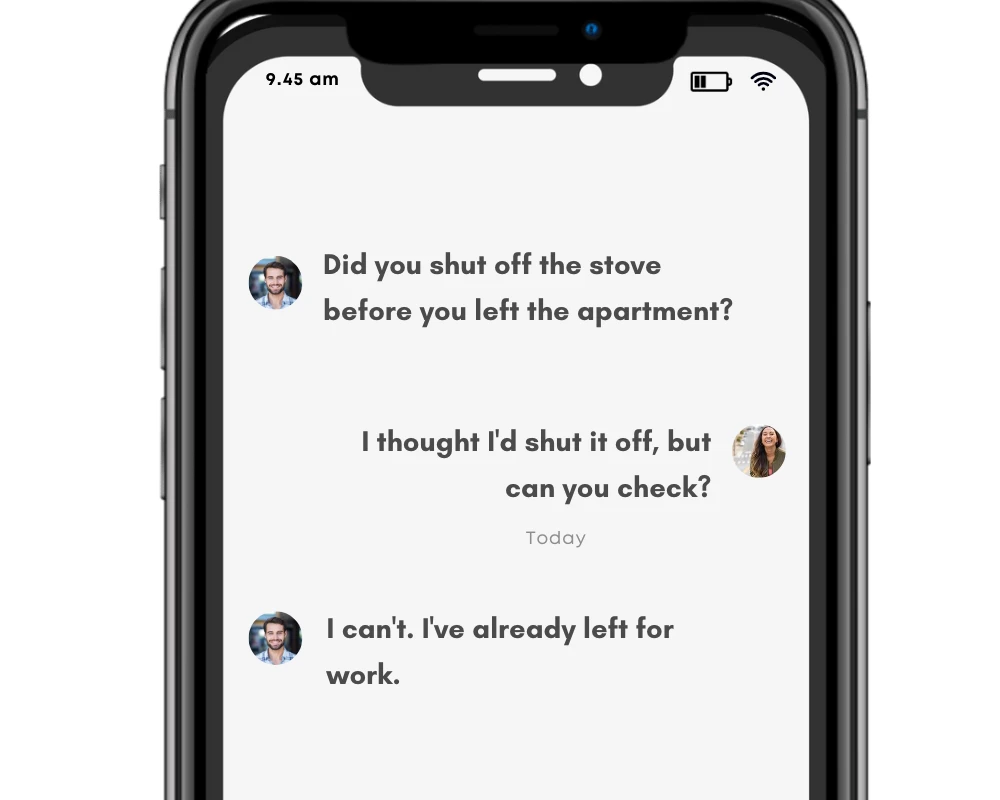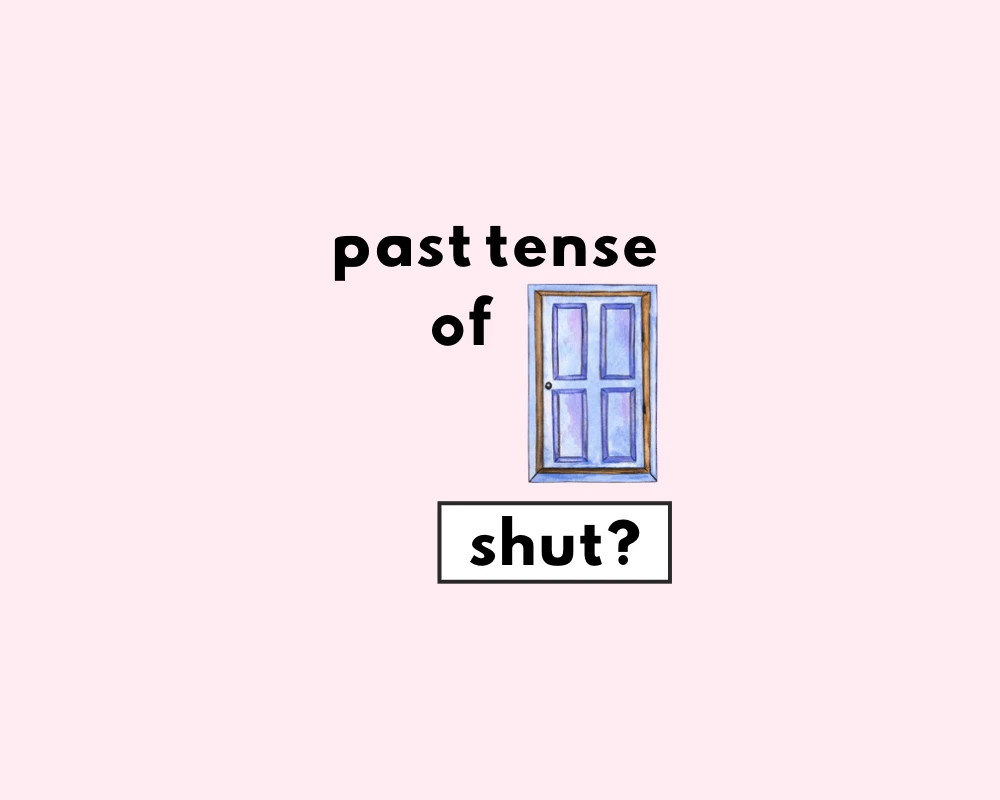
What’s the past tense of “shut”?
‘To shut‘ belongs to the category of irregular verbs with only one form. This means that shut stays as shut in the present tense, past tense and as a past participle. This makes shut an easy irregular verb to remember, relatively speaking.
I shut the door.
It shuts automatically.
I shutted my eyes.
The store shut for years.
Verb forms of shut
Let’s define the topic first. The verb shut, as described by Collins Dictionary, is when we “close something; to become closed.” Synonyms for shut include close or fasten.
| present | past | future | |
| simple | I shut | I shut | I will shut |
| continuous | I am shutting | I was shutting | I will be shutting |
| perfect | I have shut | I had shut | I will have shut |
| perfect continuous | I have been shutting | I had been shutting | I will have been shutting |
1. To shut is in the present tense: The window won’t shut.
2. Shut is the simple past: She shut her eyes and fell asleep immediately.
3. Shut is also the past perfet: He had shut his book and looked up at her into her eyes.
Is shut a regular or irregular verb?
The verb shut is irregular since it only has one past verb form. The present participle is cutting, and the third person singular form is shuts. Remember that the difference between regular and irregular verbs is that regular verbs end in –ed in their past forms, whereas irregular verbs end in something other than –ed in their past forms. See the chart of other irregular verbs with one past verb form (like shut):
| base verb | past tense | past participle |
| cut | cut | cut |
| burst | burst | burst |
| bet | bet | bet |
| shut | shut | sunk |
| hit | hit | hit |
| set | set | set |
Past tense vs past participle of shut: what’s the difference?
In general, we can identify when the participle form of a verb is in use based on the presence of any auxiliary/helper verbs. Compare the following:
1. He shut the door and locked it before leaving. (past simple)
2. He had shut the door carefully so as not to wake her up. (past perfect)
What’s the difference between the first and second sentence? Both are in the past tense, and so describe actions or states that have been completed entirely in the past. The difference is subtle, but in the second sentence we can see there’s an auxiliary verb that precedes shut, e.g., had. This pairing of the past participle with the auxiliary had forms the past perfect tense in English. Typically, the past perfect tense is used when looking to clarify the order in which past events occurred in close succession/proximity.
Examples of the verb shut in present tense
1. The bank shuts at 4.
2. The factory is going to shut next year. (future tense)
3. The window won’t shut.
4. The doors open and shut automatically.
5. We left the hotel only to discover that the whole city shuts at 10.30.
Practice using the verb in different tenses with example sentences to memorize the correct forms.
Examples of shut in the past tense
1. Philip went into his room and shut the door behind him.
2. The door shuts and locks behind her.
3. She shut her eyes and fell asleep immediately.
4. She decided to shut her ears to all the rumours.
5. He shut his book and looked up.
Examples of the verb shut as a past participle:
1. They have warned residents to stay inside and keep their doors and windows shut.
2. She was careful not to shut the door on the possibility of further talks.
3. The athletes were warned to keep their mouths shut about politics.
4. The exit doors were locked shut.
5. I’ve made this trip so often, I could do it with my eyes shut.
Origin of the verb shut
From etymology online on shut (v.):
Middle English shitten, sheten, “close (a door, window, gate, etc.); lock, fasten closed,” from Old English scyttan “to put (a bolt) in place so as to fasten a door or gate, bolt, shut to; discharge, pay off,” from West Germanic *skutjan.
Other commonly confused verb tenses
- What’s the past tense of spread?
- What’s the past tense of lead?
- What’s the past tense of choose?
- What’s the past tense of fly?
- What’s the past tense of lay?
- What’s the past tense of drive?
- What’s the past tense of draw?
Learn more about verbs
- What are regular and irregular verbs?
- Transitive and intransitive verbs?
- What are verbs?
- What’re personal pronouns?
- What’s the difference between they’re, their, and there?
- Whose vs who’s?
Worksheet
According to the blog post, what is the simple past tense of the verb “shut”?
What category of verb does “shut” belong to, as discussed in the post?
Which of these verbs is mentioned in the post as following the same irregular pattern as “shut” (one form for base, past, and past participle)?
What form of “shut” is used as the past participle?
How can you often identify the past participle form of “shut” in a sentence, according to the post?
Fill in the blank with the correct simple past form of “shut”: She _______ her eyes and fell asleep immediately.
Fill in the blank with the correct past participle form of “shut”: By the time I arrived, they had already _______ the store.
Fill in the blank with the correct simple past form of “shut”: He quickly _______ the window to keep the rain out.
Fill in the blank with the correct past participle form of “shut”: She couldn’t open the box because someone had _______ it tightly.
Fill in the blank with the correct form: I wish I hadn’t _______ my mouth! (using the past participle form of “shut”)
Frequently Asked Questions
What is the past tense of ‘shut’?
+
Is ‘shut’ a regular or irregular verb?
+
What are the verb forms of ‘shut’?
+
How is ‘shut’ used in past tense examples?
+
Is ‘shutted’ the past tense of ‘shut’?
+
Yash, D. "What’s the Past Tense of Shut? Shut or Shutted?." Grammarflex, Jun 6, 2025, https://www.grammarflex.com/whats-the-past-tense-of-shut-shut-or-shutted/.
Sources
-
“Shut.” Merriam-Webster.com Dictionary, Merriam-Webster, https://www.merriam-webster.com/dictionary/shut. Accessed 21 Feb. 2023.











